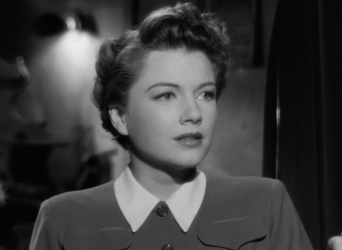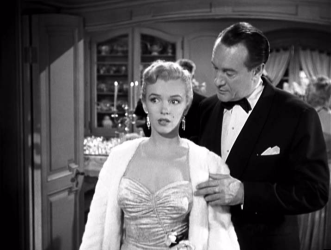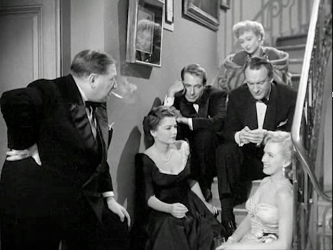I say, with not a hint of sarcasm, that every time I see All About Eve, I think “That Eve seems nice. A little intense, but nice.”
And then, of course, as the film wears on, I remember.
Oh. Right.

And that’s why I’d never make it in Hollywood.
I don’t remember the details of the movie much after the fact, though I’m never quite sure why not. It is a genuinely brilliant film, a breezy 2 hours and 20 minutes (something you know I don’t say lightly) that wastes no time, and isn’t too, y’know, actory. Despite being well ensconced in the showbiz world (the stage mostly, and not movies), the story is fundamentally about the nature of trust and friendship, and in no small way a comment on glamour.
If you’re not familiar with the film, the story is this: We open to a big awards show where Eve Harrington (Anne Baxter) is being feted while her “friends” that she’s thanking can barely keep from rolling their eyes, their inner dialogues at odds with the scene presented. Flash back a year and we see the same Eve as a star-struck ingenue, hoping for the mildest of blessings from her heroine, Margo Channing (Bette Davis). Brought in by Eve’s friend, Karen (the wife of a playwright that helped make Margo famous) and encouraged by the writer himself, Margo ends up taking the young girl under her wing.
Once established, Eve encroaches more and more on Margo’s life in ways that alternately make the friends uncomfortable, but never enough for them to form a full picture of her ambitious designs. Hell, I fall for it every time, even though the movie hints right away that something is not quite right about Eve (and even though I’ve seen it at least three times before). That would be a tribute to Ms. Baxter, and to some exquisite writing from director Joseph Mankiewicz.

You’re gaslighting me and I’m the jerk?
Needless to say the acting is perfect, as if the roles were made specifically for the players. After this, Davis’ career would sputter around in TV and lesser movies until she went full frump in Whatever Happened to Baby Jane? Which, when you think about it, really does mean it was the perfect part for her, as Margo is feeling the ravages of time and whether it was artfully misapplied makeup or just the facts of the case, Davis’ own age is undeniable. She wouldn’t be playing a lot of love interests after this.
George Sanders as Addison DeWitt, the critic, is quintessential Sanders. He gets Eve right away, and quickly out-maneuvers her—but in the end you can’t help but think his victory is a hollow one. Like the dysfunctional romance of Gone With The Wind, ratcheted up several notches to near sociopathy.
A surprise and delight every time is the canny performance given by Marilyn Monroe (in her first major movie performance) as Miss Casswell, a once again beautifully written part that plays marvelously off of Sanders’ droll cynicism. The Flower was very taken by her here, as I always am, even though I have never been a huge fan, nor entirely “gotten” Norma Jean’s appeal. The Flower, who is much taken with pinups and aspires to Gil Evgren-style artistry, independently expressed the same puzzlement prior to this film. (We would both completely reverse our reservations some time later watching Some Like It Hot.)

We feel for those who had to work with her but we’re happy she was there.
So: Perfect writing, acting, directing—oh! and dead-on score by Alfred Newman, which is not as easy as it sounds given the rather delicate tone needed to move the story along dramatically without descending into melodrama. This is one of those films you can’t even imagine being made today. It’s a talky actor’s film, essentially, but it endeavors in every scene, and every shot, to entertain. That is to say, this movie is what it is because of its actors, unquestionably, but it never depends on them to be the sole reason to see it.
Mankiewicz had an astonishing career in a lot of ways, starting as a writer in the last years of the silents, and this was probably the height of his creativity. But even with A Letter To Three Wives, The Ghost and Mrs. Muir and Guys and Dolls in this period, you can find his fingerprints on fun ’30s flicks like The Three Godfathers, as a producer The Philadelphia Story in 1940, and he would end his career in 1972 with one of his best films, the under-rated Sleuth, with Michael Caine and Laurence Olivier.
It’s not unique to call this an “essential”, but I will add my voices to that chorus. Virtuoso filmmaking,

And look at that blocking!
